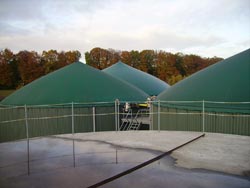Biogas from Anaerobic Digestion
The management of wastes in the UK is in a period of dramatic change. One of these changes will be the diversion of degradable material away from landfill and the management of these wastes as a resource.

Biogas Plant
At RPS we believe that this can be best achieved by anaerobic digestion, as this not only allows careful management and reprocessing of the wastes, but also offers the opportunity for significant carbon savings in the waste sector. By applying our biogas utilisation expertise, we are developing in partnership a range of AD facilities that will process not only the degradable fraction of municipal wastes, but also commercial, agricultural and food processing wastes.
This is an approach that is supported by the latest policy research on the carbon balances of waste management and is now recognised in the Waste Strategy for England as the preferred option for the treatment of degradable materials where possible.
Technology
Feedstocks
Any organic carbon containing material can be digested in an AD plant to create biogas. However, the rate at which materials can be processed varies and the design of the plant may need to be tailored to maximise the potential energy recovery and environmental benefits.
| Municipal collections: | Commercial collections: |
|
|
For RPS, the following are the most likely feedstock for a commercial project of the type proposed.
Kitchen and garden wastes
Most areas of the country now have a dedicated green waste collection systems, of which the majority are for garden type materials. These on their own are not idea feedstocks as the long molecules of lignum found in woody materials are very slow to degrade. However, there is much interest in the collection of kitchen residues as well, although as these potentially contain meat, must be treated as animal by-products. Systems that collect the two types of material together create a far higher level of high risk material that requires processing as if it contains animal by-products. Whilst biological material remaining from intensive material recovery plants (MRF’s and MBT’s) can be treated via an AD facility, the resulting product will always need to be treated as a waste.
Significant quantities of commercially collected kitchen wastes (from institutions and restaurants) and green wastes (from landscaping contractors) is also available, but is currently more haphazard in its treatment
Food Processing Residues
Many types of food processing residues are available for energy recovery, including vegetable and fruit rejects and off-cuts, abattoir wastes and process industry residues, such as brewery grains. Whilst some of these residues have alternative uses, most could be also used for energy recovery.
Animal Manure
Animal manure accumulates whenever animals are held in open yards or housed indoors. The three main sources of such slurries that will be examined in this study are from cattle, pigs and poultry. Dairy cattle are normally only housed during the winter and at milking time, whilst a significant proportion of beef cattle, pigs and poultry are housed all year round. Changes in agricultural practice to reflect higher welfare standards are likely to increase the total amount of manure for housed animals in addition to increasing the dry matter content due to the inclusion of bedding materials.
Plant Description
At RPS we are not tied to any one technology supplier, but we work to tailor the plant to the feedstock available, the degree of flexibility needed and any site specific factors.
| Wet processes: | Dry processes: | |
Key Issues:
|
Key Issues:
|
|
Example Technology Suppliers:
|
Example Technology Suppliers:
|
|
Click here for Environmental benefits of Anaerobic digestion
